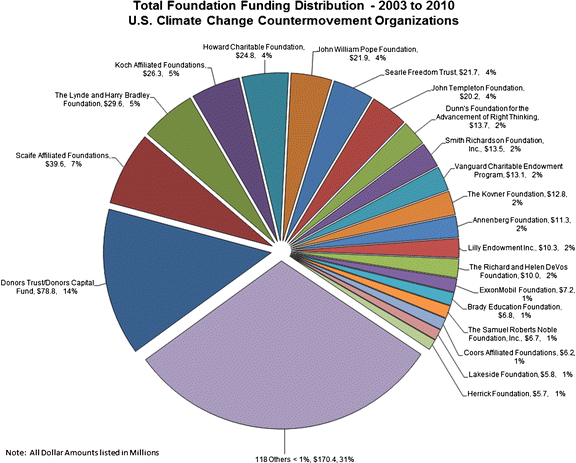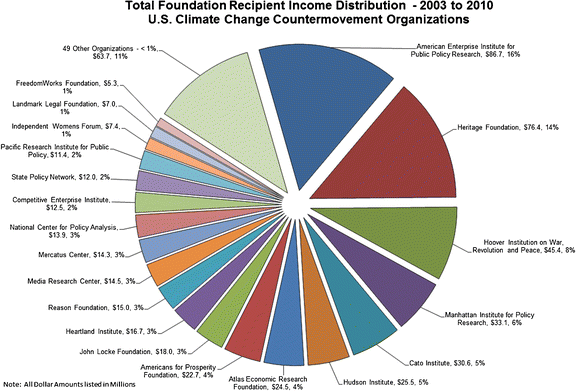The best we can do is analyze the methodology of the referenced work (Brulle 2013).
Identifying relevant organizations
They identified 118 Climate Change Counter Movement (CCCM) organizations by considering all organizations identified as such in prior studies and then selecting those that had a substantial focus on climate change. The coding form is at S-2 in the supplementary material. The 118 organizations identified as belonging to the CCCM are at S-3 in the supplementary material.
60 Plus
Committee For A Constructive Tomorrow
International Climate And Environmental Change At Pjt (I)
Advancement Of Sound Science Center Inc. The)
Competitive Enterprise Institute
International Climate Science Coalition
Alliance For Climate Strategies (ACS)
Congress Of Racial Equality
International Policy Network
American Coal Foundation
Consumer Alert/National Consumer Coalition
James Madison Institute
American Coalition For Clean Coal Electricity (ACCCE)
Consumer Energy Alliance
John Locke Foundation
American Conservative Union Foundation
Cooler Heads Coalition
Landmark Legal Foundation
American Council For Capital Formation
Cornwall Alliance For The Stewardship Of Creation
Manhattan Institute For Policy Research
American Council For Capital Formation Center For Policy Research
Edison Electric Institute
Manhattan Libertarian Party
American Energy Alliance/Institute For Energy Research
Energy Citizens
Media Research Center
American Energy Freedom Center
Energy Makes America Great
Mercatus Center, George Mason University
American Enterprise Institute For Public Policy Research
Environmental Literacy Council
Mountain States Legal Foundation
American Farm Bureau
Federation For American Coal, Energy And Security
National Association Of Manufacturers
American Friends Of The Institute Of Economic Affairs
Free Enterprise Action Institute/Free Enterprise Education Institute
National Center For Policy Analysis
American Gas Association
Freedom Action
National Center For Public Policy Research
American Legislative Exchange Council
Freedom Works
National Mining Association
American Natural Gas Alliance
Freedom Works Foundation
National Petrochemical And Refiners Association
American Petroleum Institute
Friends Of Coal
National Petroleum Council
American Policy Center
Frontiers Of Freedom Institute And Foundation
National Rural Electric Cooperative Association
American Tradition Institute
George C. Marshall Institute
National Taxpayers Union
Americans For Balanced Energy Choices (ABEC)
Global Climate Coalition
National Taxpayers Union Foundation
Americans For Prosperity/Americans For Prosperity Foundation
Global Climate Information Project
Oklahoma Council Of Public Affairs
Annapolis Center For Science-Based Public Policy
Global Warming Initiative
Oregon Institute Of Science And Medicine
Association Of Global Automobile Manufacturers
Greening Earth Society
Pacific Research Institute For Public Policy
Atlas Economic Research Foundation
Heartland Institute
Plants Need Co2
Capital Research Center/Greenwatch
Heritage Foundation
Reason Foundation/Reason Public Policy Institute
Cascade Policy Institute
Hoover Institution
Responsible Resources
Cato Institute
Hudson Institute
Science And Environment Policy Project
Center For The Defense Of Free Enterprise
Ice Age Now
Science And Public Policy Institute
Center For The Study Of Carbon Dioxide And Global Change/CO2 Si
Independence Institute
Southeastern Legal Foundation
Chamber Of Commerce Of The United States Of America
Independent Institute
Sovereignty International
Citizen's Coalition On Global Climate Policy
Independent Petroleum Association Of America
State Policy Network
Citizens For Affordable Energy
Independent Women's Forum
Surface Stations. Org
Climate Audit
Industrial Energy Consumers Of America
Texas Public Policy Foundation
Climate Science Coalition Of America
Information Council On The Environment
Thomas Jefferson Institute For Public Policy
Climate Strategies Watch
Institute For Biospheric Research
TS August/The Second Of August
CO2 Is Green
Institute For Energy Research
Washington Policy Center
Coalition For American Jobs
Institute For Liberty
Western Fuels Association
Coalition For Vehicle Choice
Institute For The Study Of Earth And Man
World Climate Report
Coalition To Preserve American Security And Sovereignty
Intermountain Rural Electric Association
World Coal Association
Collegians for a Constructive Tomorrow
In my opinion, this is a methodological weak point (or at least a lacking sufficient description in the paper and supplementary material). He doesn't describe how the initial list was collected. He doesn't tell us if multiple coders were used and how conflicts between them were resolved. Confidence in this study would be strengthened by sharing the initial list of organizations, clarifying the coding procedure, and sharing the coding sheets for all the organizations considered.
Analyzing the income of the CCCM organizations
After identifying organizations to be considered part of the CCCM, Brulle then assesses how each institution is maintained. He argues that "One of the major influences on the institutional capacity of movement organizations is the level of financial resources. An examination of both the levels and sources of financial resources available to an organization provides a means to assess its institutional capacity, and thus its potential influence within the CCCM."
This study does not attempt to identify how much funding was spent on advocacy relating to climate change. It simply identifies: how are the organizations that are part of the CCCM funded? Brulle says: "Since the majority of the organizations are multiple focus organizations, not all of this income was devoted to climate change activities." Again, this study is only designed to answer the question: how are the organizations identified as part of the CCCM funded?
Brulle analyzed the income sources for these organizations by looking at "IRS data were extracted from both the National Center for Charitable Statistics and the Foundation Center for the period 2003 to 2010". However, IRS data was only available for 91 of the 118 identified organizations.
The final sample that he worked with were the 91 organizations for which IRS data was available. (The other 27 organizations had not filed for non-profit status and thus were not required to submit funding information.)
For those 91 organizations, they only counted funding foundations that gave $500,000 or more over the 2003-2010 period, or $200,000 or more in any one year. (Limiting the dataset to only large funders resulting in 10% of peripheral funding being uncounted.) They consolidated foundations that operated under the same controlling boards, resulting in the 140 foundations. Those 140 separate funding foundations made "5,299 grants totaling $558 million". The grants were given to 69 of the 91 CCCMs that had IRS data. The remaining 22 CCCMs had no record of any grants being received.
Total income
These 91 organizations received 7,225,218,809 of income over the 2003-2010 study period.
Where does the income come from?
For trade associations, the single largest source of income is membership dues, providing nearly half of their income, and foundation grants are not relevant.
Charitable organizations (501 (c) 3) receive 25% of their income from foundation grants.
Advocacy organizations (501 (c) 4) receive 14% of their income from foundation grants.
There is also a large amount of undisclosed contributions. Some organizations receive less than 30% of income as undisclosed contributions. However, 36% of the 501 (c) 3/4 CCCM organizations receive more than 90% of income as undisclosed contributions.
How much do large funders fund?
For 501 (c) 3 and 501 (c) 4 organizations, the range is nearly 0 to as high as 74% of income that comes in the form of grants from funding foundations. The mean is 24.8%.
Who's giving the money?

A bunch of it flows through Donors Trust and Donors Capital. These are donor directed funds, through which individual donors can give and direct their money to specific organizations, while maintaining anonymity.
Who's getting the money?

Conservative think tanks were the largest recipients of foundation support. These think tanks, including the American Enterprise Institute, the Heritage Foundation, and the Cato Institute, are among the best known conservative think tanks in the United States.
Conclusions and other observations
The author concludes that since the major funding foundations are "well-known and prominent conservative funders", and since the major receiving organizations are "core actors in the larger conservative movement", that the "CCCM is a subsidiary movement of the larger conservative movement".
He also notes that Koch and ExxonMobil foundations have stopped publicly funding CCCM organizations. This decreasing in public funding coincides with an increase in funding via Donors Trust and Donors Capital. The author speculates that this is simply a shifting in funding.
Analyzing the claims
shows how a network of 91 think tanks and industry groups are primarily responsible for conservative opposition to climate policy.
This would be a plausible conclusion. However, because 27 of the CCCM organizations initially identified had no funding information available, it's possible that they are actually more responsible for the conservative opposition to climate policy, or that the large amounts of undisclosed donors are more responsible. The study didn't address that or primary responsibility at all.
Almost 80 percent of these groups are registered as charitable organizations for tax purposes
Yes. Actually, 76%. (69/91).
and collectively received more than seven billion dollars between 2003 and 2010.
Yes. $7,225,218,809.
The implication of the research is that the majority of the opposition to both the science of climate change and government policies intended to mitigate it is just paid advocacy and not genuine skepticism.
No, that is not the implication. The study demonstrated that many organizations receive a lot (0-74%, with a mean of 24.8%) from primarily conservative funding foundations, it did not conclude that this paid advocacy is not genuine skepticism. It did observe that due to the financial incentives, funding foundations can select from among the applicant organizations, and choose those that will advocate in line with their goals. That does not preclude the applicant organizations from legitimately believing in what they are advocating.
The conclusion of this study is that conservative funding organizations play a "major role" in the CCCM. The study did not conclude that it is "primarily responsible", and did not conclude that the arguments being made are not "genuine skepticism".
I'm skeptical because some of the more interesting climate skeptics don't seem to be part of this network despite the claim that it is "primarily responsible" for opposition to climate policy.
That may certainly be the case. They didn't filter based on interesting-ness. They excluded 27 of the 118 CCCM groups from this study because they didn't have any public funding information available. Perhaps the ones that you find interesting are among those 27.
Genuine skepticism
Judging how genuine an organization's skepticism is should be ignorant of its funding. In my opinion, we can make judgements about an organization's level of skepticism, but that judgement should be based on its treatment of the evidence. Does it cherry-pick? Does it update its advocacy in light of new evidence? Does it overstate the conclusions of poorly conducted studies and understate or ignore the conclusions of more rigorous studies? Are they simply being contrarian rather than being skeptical? Are they letting the science lead them?
And even if we can make a judgement about an organization's general level of skepticism, that shouldn't affect our analysis of any one of their positions or arguments in particular. Each should stand or fall by its own merits.
References
Brulle, Robert J. "Institutionalizing delay: foundation funding and the creation of US climate change counter-movement organizations." Climatic Change (2013): 1-14. (Supplemental material)


